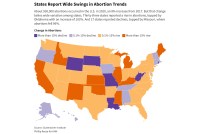KHN’s ‘What the Health?’: A World Without ‘Roe’
The Supreme Court’s decision overturning Roe v. Wade has created far more questions than it has answered about the continued legality and availability of abortion, as both abortion rights supporters and anti-abortion activists scramble to put their marks on policy. Meanwhile, Congress completes work on its gun bill and the FDA takes up the problem of the next covid-19 booster. Margot Sanger-Katz of The New York Times, Sarah Karlin-Smith of the Pink Sheet, and Victoria Knight of KHN join KHN’s Julie Rovner to discuss these issues and more. Also this week, Rovner interviews KHN’s Angela Hart, who reported and wrote the latest KHN-NPR “Bill of the Month” episode about two identical eye surgeries with very different price tags.
Watch: Crossing State Lines for Abortion Care
Illinois is one of the few states in the middle of the country where people can still legally access abortion care.
‘American Diagnosis’: Indigenous Advocates Work for Better Reproductive Care
From forced sterilizations in the 1960s to scant access to abortion care today, barriers to health care threaten Native people’s reproductive autonomy. Episode 7 explores efforts to protect and expand Native Americans’ access to comprehensive reproductive and sexual health care.
Three-Year Abortion Trends Vary Dramatically by State
About 930,000 abortions occurred in the U.S. in 2020, an 8% increase from 2017. But that nationwide figure belies dramatic variation among states — disparities expected to magnify in the wake of the Supreme Court’s decision to strike down Roe v. Wade.
Bajo las nuevas reglas para abortos, es más difícil lidiar con resultados de pruebas genéticas
Las embarazadas que reciben devastadoras noticias sobre condiciones genéticas deben lidiar con un estrés extra si deciden abortar y viven en estados que restrigen y hasta penalizan la práctica.
Genetic Screening Results Just Got Harder to Handle Under New Abortion Rules
Most prenatal genetic tests aren’t performed until after 11 weeks’ gestation, and the time between drawing a sample and getting results may be additional weeks. But new abortion restrictions prevent parents from choosing an abortion when they find out their child has a genetic disease, and make the already difficult decision for them.
Cinco cosas que hay que saber sobre el aborto ahora que la Corte Suprema anuló Roe vs. Wade
Con esta decisión, los estados tienen la capacidad de establecer sus propias restricciones, por lo que el lugar en el que viven las personas determinará su nivel de acceso al aborto.
KHN’s ‘What the Health?’: Supreme Court Overturns ‘Roe’
It was expected, but the reality was still jarring: The Supreme Court has formally overturned Roe v. Wade, erasing the nearly 50-year-old guarantee of abortion rights nationwide. Joanne Kenen of the Johns Hopkins Bloomberg School of Public Health, Sarah Varney of KHN, and Laurie Sobel, associate director for women’s health policy at KFF, join KHN’s Julie Rovner for this special episode to talk about the decision and what happens next for reproductive health care.
Como se esperaba, conservadores de la Corte Suprema terminan con el derecho al aborto
El presidente Joe Biden dijo que estaba en total desacuerdo con el fallo. “Es un día triste para la corte y para el país”, dijo. “La salud y la vida de las mujeres en esta nación ahora están en riesgo”.
‘It’s Not a Haven’: With Limited Capacity for Abortion Care, Minnesota Clinics Brace for Influx
In Minnesota, where abortion rights are protected by the state’s constitution, legal doesn’t necessarily mean accessible. The state has just eight clinics that provide abortions, and both providers and advocates say resources available aren’t enough to meet demand as nearby states reduce abortion access.
Five Things to Know Now That the Supreme Court Has Overturned Roe v. Wade
By undoing that landmark decision, the law of the land since 1973, the court has empowered states to set their own abortion restrictions — so where people live will determine their level of access.
After Two Ectopic Pregnancies, I Fear What Might Happen Without Roe v. Wade
A journalism professor’s four failed pregnancies forced her to use procedures or drugs that could soon be difficult to turn to.
A Post-‘Roe’ World in Georgia Will Mean More Restrictions — And More Political Battles
Abortion will almost certainly face new restrictions in Georgia. Patients will have a harder time finding services, and providers will have to figure out how to navigate the new landscape. Meanwhile, abortion opponents see the moment as an opportunity to put further restrictions on the procedure.
Conservatives on Supreme Court, as Expected, End Nationwide Right to Abortion
The 6-3 decision, telegraphed in May by an unprecedented leak of a draft opinion, eliminates the right to abortion as if it never existed at all.
Readers and Tweeters Weigh In on Medical Debt, the Obesity Epidemic, and Opioid Battles
KHN gives readers a chance to comment on a recent batch of stories.
KHN’s ‘What the Health?’: The FDA Goes After Nicotine
The FDA is using its power to regulate tobacco products — ordering the vaping device Juul off the market and announcing its intention to lower the amount of nicotine in cigarettes and other products. Meanwhile, the Supreme Court rules on Medicare and kidney dialysis, and Congress makes progress on legislation surrounding guns and mental health. Joanne Kenen of the Johns Hopkins Bloomberg School of Public Health and Politico, and Rachel Cohrs of Stat join KHN’s Julie Rovner to discuss these issues and more. Also this week, Rovner interviews KHN’s Noam N. Levey about the new KHN-NPR project on the growing impact of medical debt.
Tribes Show Little Interest in Offering Abortions on Reservations Despite Speculation They Could
The notion that Native American nations could use tribal sovereignty to bypass state restrictions on abortion if Roe v. Wade falls is an idea largely proposed by non-Native groups.
Two Tennessee Abortion Clinics, Awaiting High-Court Ruling, Grapple With Uncertainty
The landmark Roe v. Wade decision could soon be overturned. Two Knoxville-based providers of reproductive health care wonder how — and if — they will continue to serve their patients.
KHN’s ‘What the Health?’: Closing In on Covid Vaccines for ‘The Littles’
The wait is nearly over for parents of kids under 5 as a key advisory committee to the FDA recommends authorizing a covid-19 vaccine for the youngest children. Meanwhile, Congress is struggling to fill in the details of its gun control compromise, and, as the Supreme Court prepares to throw the question of abortion legality back to the states, the number of abortions has been rising. Shefali Luthra of The 19th, Sarah Karlin-Smith of the Pink Sheet, and Sandhya Raman of CQ Roll Call join KHN’s Julie Rovner to discuss these issues and more. Plus, for extra credit, the panelists recommend their favorite health policy stories of the week they think you should read, too.
KHN’s ‘What the Health?’: Taking a Shot at Gun Control
The U.S. House passed a package of bills seeking to keep some guns out of the hands of children and teenagers, but its fate in the Senate remains a big question mark. Meanwhile, the Federal Trade Commission takes on drug and hospital prices. Alice Miranda Ollstein of Politico, Anna Edney of Bloomberg News, and Joanne Kenen of the Johns Hopkins Bloomberg School of Public Health and Politico join KHN’s Julie Rovner to discuss these issues and more. Also this week, Rovner interviews Cori Uccello of the American Academy of Actuaries about the most recent report from Medicare’s trustees board.



















